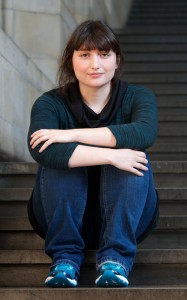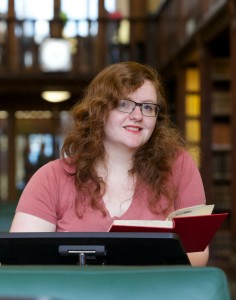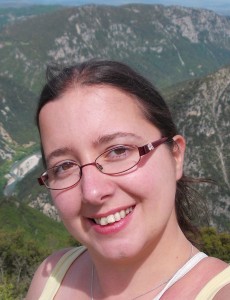 Rebecca Ingle is a second year PhD student in the Bristol Laser Group in the School of Chemistry. Her research involves studying photodissociation dynamics in both the gas and solution phase using a combination of laser experiments and computational chemistry methods.
Rebecca Ingle is a second year PhD student in the Bristol Laser Group in the School of Chemistry. Her research involves studying photodissociation dynamics in both the gas and solution phase using a combination of laser experiments and computational chemistry methods.
At its heart, a PhD might seem quite a simple thing. Bumble around in a lab for a few years, try to find conferences in the most exotic corners of the Earth, write a few things down. However, as well as the exciting cutting edge research, there are a whole host of other opportunities to challenge yourself with, including trying your hand at teaching.
Some people might consider teaching a waste of time; after all, you won’t have much of a PhD if you don’t have a tome of research to submit at the end. However, it can be an excellent way of developing your confidence, learning about some new subject areas and picking up some so-called ‘employability-skills’ if you are ever planning on leaving the realm of perpetual studenthood. You might even find teaching motivates and helps with your research work, rather than detracting from it.
If you’re looking back on your first year undergraduate studies with a warm sense of nostalgia, longing for the days when you thought you knew everything, then perhaps teaching is also for you. But how do you go about getting involved and more importantly, how do you start becoming an effective teacher?
Choose your Audience
There are a huge number of opportunities available for teaching, both in and outside of the university. Maybe herding groups of undergraduates and their chemicals back to the fume hoods, where they belong, sounds like the challenge for you or maybe you’d rather try to instil a love of maths in the younger generation. Regardless of what size groups or subjects you want to teach, you can probably find something to suit.
If you fancy venturing outside of the university, the market for GCSE and A Level tutors is huge. It is even possible to teach online now. However, it is worth doing your homework if you are planning on tutoring through an agency to ensure that they are reputable and exactly what cut of your earnings they take. Although perhaps less lucrative, schools are often keen to get support with after-school science clubs or additional support for students.
Most departmental opportunities are advertised by email but it can be worth keeping an eye on opportunities on a university level as well as via Widening Participation and the Careers Service.
Be Prepared
It may seem obvious, but the better you know the material yourself, the better you will be able to deliver it. The more thorough your understanding, the easier it will be to come up with alternative explanations to try and make sure all your students understand the material. If you have a feeling for what students typically find difficult on a course, it can be worth preparing extra questions or examples to give them more opportunity to practice and feel more confident.
However, no matter how hard you’ve studied the subject, some enthusiastic student will come up with a question you had no way of anticipating. Cue desperately trying to remember what you definitely knew four years ago to avoid shattering the naïve illusions of undergraduates that think you are the font of all knowledge. On the plus side, getting used to thinking on your feet in these situations makes question time at conference talks seem like a breeze.
If avoiding working with projectors and computers is impossible, turn up to the room three hours early, preferably with someone from IT in tow. The closer it is to the start of the lesson, the greater the likelihood that the computer will refuse to log on, decide that .ppt is an unknown file extension and delete all your files.
Seek Help
If you are completely new to teaching and have no idea how to cultivate the aura of calm and knowledge that your lecturers seemed to manage so easily, there is a lot of help out there. The University runs several ‘Starting to Teach’ courses specifically to address this problem and course organisers are normally only too happy to help, as if you fail to answer the students’ questions, they’ll only get asked them later.
Course organisers and other PhDs typically know what the most common issues and problems are likely to be or if you’re helping with practical sessions, ten different ways to switch the equipment off and on again to get it to work. Your supervisor might have some sagely tricks of the trade to share as well.
It can be nervewracking standing up in front of a class, hoping that after an hour, the whiteboard of algebra will suddenly make sense to everyone but it can be immensely rewarding seeing students making excellent progress. Being a researcher means you can often give a unique perspective of where a lot of theories are actually used and bring some seemingly useless topics to life. Sometimes the answer will be ‘I don’t know’ but you might find yourself learning as much as your students do.
















